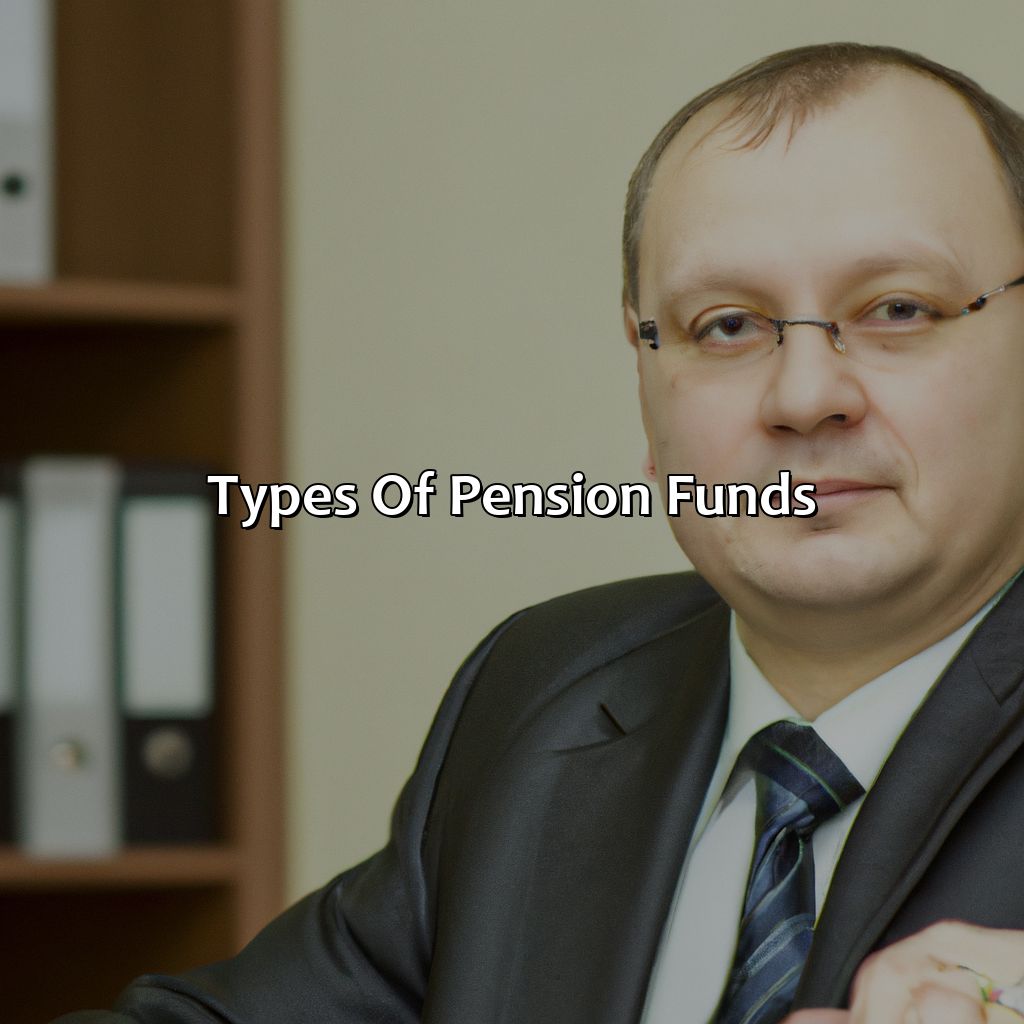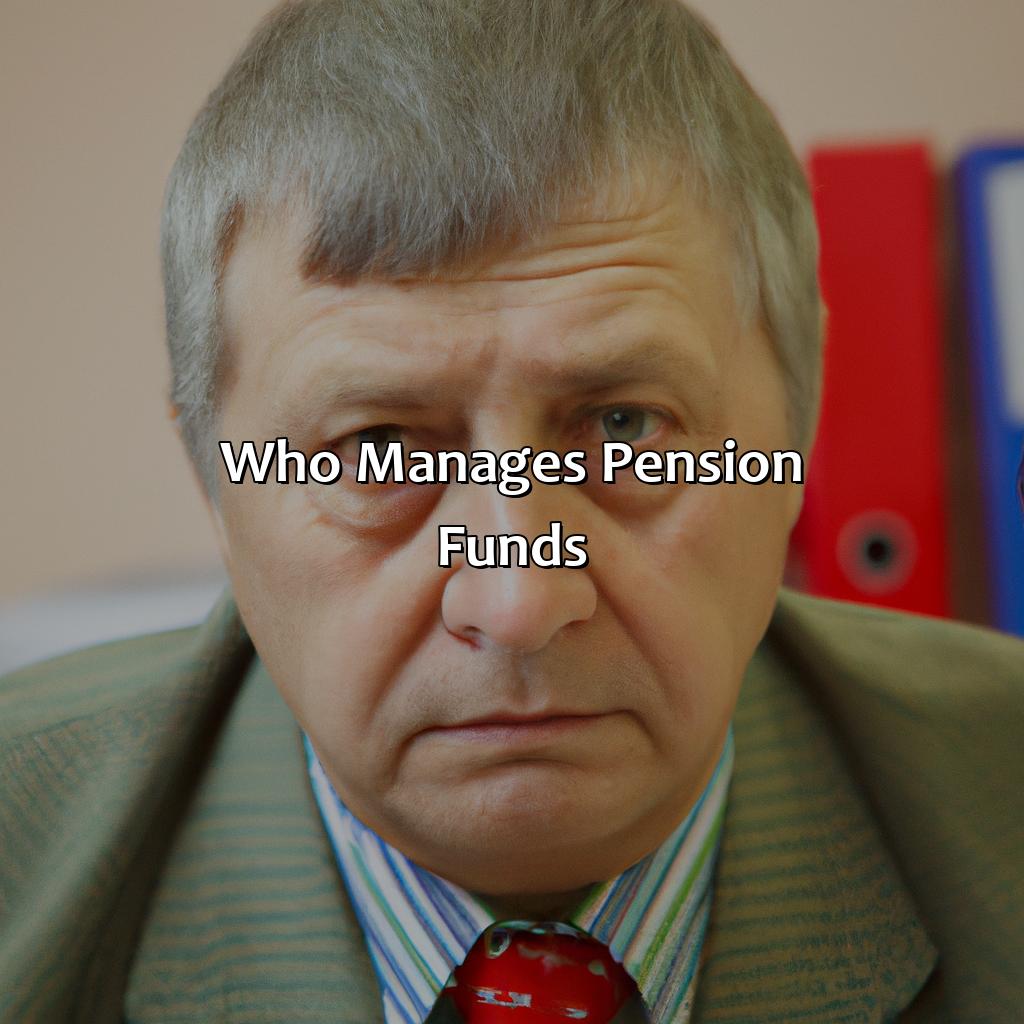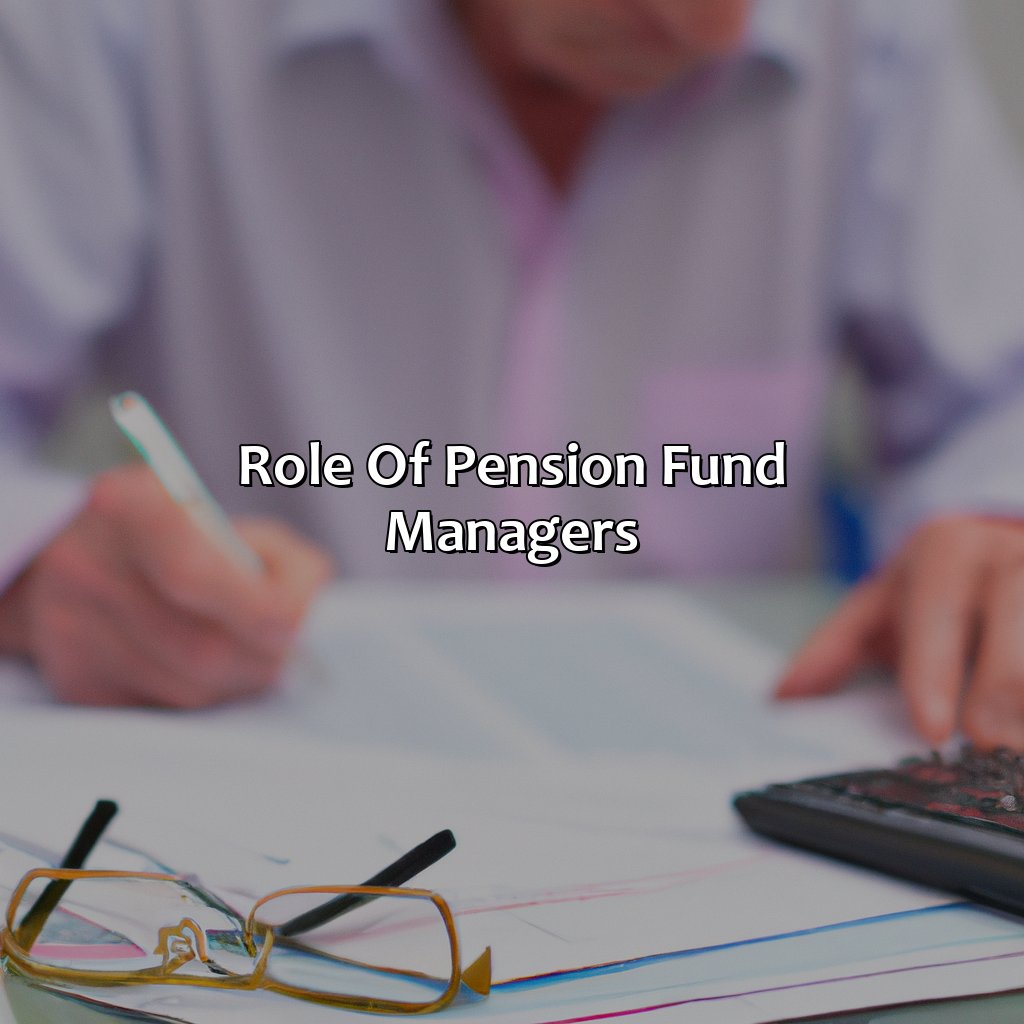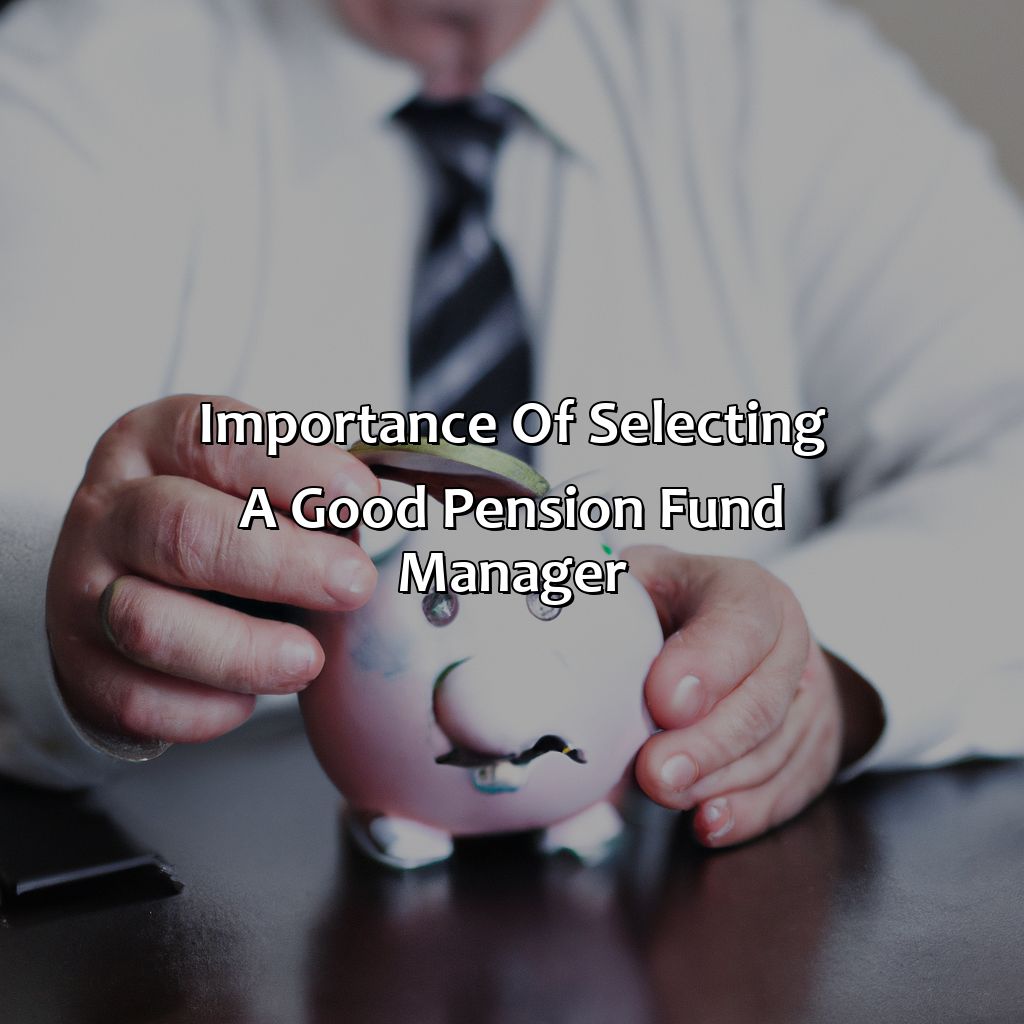Who Manages Pension Funds?
Key Takeaway:
- Pension funds are managed by pension fund managers, investment advisors, and trustees, who oversee the fund’s investments and ensure compliance with regulations.
- Pension fund managers play a critical role in selecting investment strategies and making investment decisions that impact the fund’s long-term performance and the retirement savings of plan participants.
- The importance of selecting a good pension fund manager cannot be overstated, as they can help ensure the long-term financial security of plan participants and their beneficiaries.
Are you confused about who manages your pension funds? This article provides a complete guide to understanding who is responsible for the management of your pension funds. Here, you can find out the different types of pension funds and who is responsible for each of them.
Types of pension funds
Do you want to know how pension funds work and what they offer? Here’s what you need to know. Two main types of pension funds exist: Defined Benefit Pension Plans and Defined Contribution Pension Plans. This section will explain both.

Image credits: retiregenz.com by David Jones
Defined Benefit Pension Plans
A Defined Benefit Plan is a type of pension plan that promises a specific benefit amount upon retirement regardless of investment performance. Employers manage these plans and bear the financial risk of providing benefits to employees. These plans are typically funded through employer contributions, and in some cases, employee contributions as well.
Furthermore, employers use actuarial tables to calculate the amount needed for funding these pension plans based on factors like employee salary, age, and expected lifespan. The amount calculated is then invested in various financial instruments to cover future liabilities.
These plans have been around for centuries, with some of the earliest examples being government pensions paid to Roman soldiers. Today, many countries have a public system that operates under similar principles.
Looking back into history, during the late 19th and early 20th centuries, defined benefit plans became popular in the United States as companies offered them as an incentive to attract workers. However, over time, companies started transitioning towards less costly defined contribution plans due to increasing costs associated with defined benefit pensions.
If the stock market crashes, at least you’ll have a good excuse for not being able to retire – blame your defined contribution pension plan.
Defined Contribution Pension Plans
Pension funds that involve employees setting aside a portion of their salary towards retirement are known as contribution-based pension schemes. These types of payment plans operate under a ‘Defined Contribution Pension Plan,’ where the funds added by the employee and employer are collected and invested.
The investment is handled by professional fund managers who look at the plan’s financial stability, participant information, and overall risk appetite while investing in stocks, bonds, money market instruments, or other assets. The returns generated on these investments flow back into the scheme and get apportioned according to the contributions made. Wondering what is a pension sharing order? Find out more here.
It’s worth noting that Defined Contribution Pension Plans are different from Defined Benefit Pension Plans that promise your pension benefits regardless of fluctuations in stock prices or interest rates.
In summary, Defined Contributed Pension Schemes operate under professional asset management to invest employees’ contributions; they come with certain risks but offer greater control over savings than other forms of pensions.
To ensure good oversight on personal savings compliance with applicable laws and regulations, it’s important to start saving for retirement early and consider various investment options available!
Learn more about what the UK state pension is and who manages pension funds.
Managing pension funds is like playing chess, except instead of pawns, you’re moving people’s retirement dreams.
Who manages pension funds?
Who manages pension funds? Focus on the critical actors that decide your retirement benefits. Pension fund managers, advisors, and trustees are key. Each have unique responsibilities that create a secure future for retirees.

Image credits: retiregenz.com by Joel Washington
Pension Fund Managers
Pension funds are managed by professionals who are responsible for investing and administering contributions made by employees and employers. These specialists, often called retirement fund managers, handle the investments, financial reporting, and compliance requirements of the pension plan.
The duties of pension fund managers include analyzing investment options, evaluating risk factors, diversifying portfolios and ensuring returns to meet future obligations. They must also be knowledgeable about government regulations, tax laws and accounting principles. If you’re wondering how does a pension fund work, understanding these roles is a great place to start.
In addition to these responsibilities, pension fund managers are charged with the task of balancing a long-term focus on meeting future benefit obligations with short-term needs to generate returns. This requires a combination of strategic planning skills as well as tactical execution.
Interestingly, a recent study conducted by Preqin found that the ten largest pension funds in the world manage over $6.5 trillion in assets as of October 2021.
Find out more about what percentage of the stock market is owned by pension funds and who manages them.
Why trust your retirement savings to someone with a stock portfolio that looks like a game of Jenga?
Investment Advisors
These professionals provide investment advice and assist in managing pension funds. They help analyze market trends, identify viable investment opportunities and manage risks. Investment advisors use specialized tools to create investment plans and strategies that suit the needs and objectives of pension fund managers. They keep track of the fund’s performance, regularly update the investment strategy if required and optimize the investments for maximum returns.
In addition to providing advice, Investment Advisors conduct regular reviews of the pension fund portfolio and make changes where necessary based on various factors such as market conditions or changes in regulatory requirements. They also keep a close eye on political, economic or social developments that could impact the value of an investment. To learn more about pension plans in the US, check out our article on how many pension plans exist.
Investment Advisors who manage pension funds must possess specific industry knowledge along with a financial background. Candidates require licenses in order to be qualified for roles in this field. Furthermore, they must be constantly up-to-date with current market conditions to guide sound investments that sustain consistent growth.
Don’t miss out on significant earnings for your retirement! Consult an experienced Investment Advisor today to manage your pension funds strategically and ensure a comfortable future.
Being a pension fund trustee is like playing Russian Roulette, but with other people’s money instead of bullets.
Trustees
The management of pension funds falls under the purview of individuals known as fiduciaries. These trustees are appointed to oversee and manage the funds on behalf of the beneficiaries, ensuring compliance with relevant regulations and achieving investment objectives.
Their primary responsibility is to act in the best interests of scheme members and ensure the sound financial management of pension assets. Trustees must demonstrate independence, impartiality, and prudence while making decisions that impact members’ future benefits. If you are wondering about how to find your pension information, RetireGenz has some great resources.
In addition to monitoring investment performance and risk management, trustees are tasked with engaging with scheme sponsors and stakeholders, communicating effectively with members through various channels, including annual reporting.
Trustees must keep up-to-date on industry developments, regulatory changes and adhere to governance codes. They require specialist skills such as asset allocation, investment strategy development, strategic planning & portfolio construction.
A recent case study involved a UK trustee who was fined for breaching rules related to payments to themselves for travel expenses. The incident highlights that irrespective of the fund size or location; rigorous oversight and compliance practices remain paramount in safeguarding beneficiaries’ interests.
Managing pension funds is like playing Jenga with people’s retirements – one wrong move and it all comes crashing down.
Role of pension fund managers
Pension Fund Managers: Who Manages Your Retirement Savings?
As an individual contributing to a pension fund, you may be curious about the individuals responsible for managing your retirement savings. The role of pension fund managers is to oversee and invest pension funds in a diversified range of stocks, bonds, and other assets on behalf of pension fund beneficiaries. They have a fiduciary duty to make investment decisions in the best interest of the plan participants, considering the overall risk and reward of investment options.
These fund managers are typically experienced investment professionals with extensive knowledge of the market and economic trends. They analyze economic data, monitor asset prices and company performance, and conduct extensive research on potential investments. Additionally, pension fund managers are responsible for ensuring compliance with regulatory requirements and managing risk exposure.
Apart from investment management, pension fund managers also have other responsibilities, such as monitoring fund expenses, processing distributions, and communicating with plan participants about the fund’s performance.
It is crucial to note that the performance of pension funds influences retirement outcomes. Investors who take an active interest in the management of their pension plans may have better chances of achieving their retirement goals. Therefore, it is essential to stay informed and seek professional advice if needed.
In summary, pension fund managers play a critical role in managing retirement savings. They use their expertise to invest funds in a diversified range of assets, manage risk, and ensure compliance with regulatory requirements. As an investor, it is crucial to stay up-to-date on the management of your pension fund to make informed decisions and stay on track to achieve your retirement goals.

Image credits: retiregenz.com by Harry Jones
Importance of selecting a good pension fund manager
As retirement looms, the choice of selecting a proficient pension fund administrator who manages the pension fund becomes indispensable. A good pension fund manager is responsible for making investment decisions, considering the risks, and ensuring adequate returns. The right manager strikes a balance between high-risk investments and lowers the costs of pension provisions.
Additionally, a skilled pension fund manager can recognize market trends and frequently innovate new strategies to enhance and diversify investments. They must stay updated on regulatory policies, the status of the economy and investments that could lead the pension fund astray. An excellent manager also has a good track record in their investments and is efficient in managing the fund’s logistics.
To ensure the right administrator is selected, one should consider the pension fund’s investment objectives and performance of the fund manager. Since the manager’s pay depends on the pension fund’s performance, potential candidates should be evaluated from reputable sources. If you are wondering how a pension is paid out, it depends on the type of pension plan you have and the options you choose.
It is also vital to provide a well-thought-out investment plan, such as hedging against inflation and minimizing investment costs. Communication is also key and seeking regular updates and performance reports from the administrator is a prudent move. Finally, the fund manager’s fee should be compared with market standards to avoid being overcharged.
Choosing a proficient pension fund manager is critical to securing a comfortable retirement. Considering the investment objective and the history of the administrator’s performance, creating an investment plan, communicating regularly, and comparing fees can aid in selecting the right manager. With these considerations, one can be assured of a financially secure future.

Image credits: retiregenz.com by Yuval Arnold
Five Facts About Pension Fund Management:
- ✅ Pension fund managers are responsible for investing and managing the assets of pension funds. (Source: Investopedia)
- ✅ Pension fund management requires a deep understanding of financial markets, asset allocation, and risk management. (Source: Pensions & Investments)
- ✅ Pension fund managers often work for investment firms, banks, or pension funds themselves. (Source: The Balance)
- ✅ Pension fund managers must ensure that the fund has enough assets to cover the future pension payments to retirees. (Source: Pension Rights Center)
- ✅ Pension fund management is subject to regulatory oversight to protect the interests of plan participants. (Source: U.S. Department of Labor)
FAQs about Who Manages Pension Funds?
Who manages pension funds?
Pension funds are typically managed by professional fund managers hired by the pension plan sponsor. These managers invest the funds in a variety of assets with the goal of maximizing returns and minimizing risk.
What type of organizations manage pension funds?
Pension funds can be managed by a range of organizations including investment banks, insurance companies, and asset management firms. Some pension funds may also be managed in-house by the sponsoring organization.
Are there regulatory requirements for those who manage pension funds?
Yes, pension fund managers are subject to regulatory requirements set forth by government agencies such as the Securities and Exchange Commission and the Department of Labor. These requirements help ensure that pension fund managers act in the best interests of the plan participants.
What qualifications do pension fund managers need?
Pension fund managers typically have a background in finance or economics and may hold advanced degrees in these fields. Some may also hold professional certifications such as the Chartered Financial Analyst (CFA) designation.
How are pension fund managers compensated?
Pension fund managers are typically compensated through a combination of base salary and performance-based bonuses. These bonuses are tied to the fund’s performance and may be paid out over several years to align with long-term investment goals.
Can pension fund managers make risky investments?
Pension fund managers are obligated to act in the best interests of the plan participants and are therefore required to exercise prudence when making investment decisions. While some level of risk is inherent in any investment, pension fund managers are typically expected to invest in a prudent and diversified manner to minimize risk.


